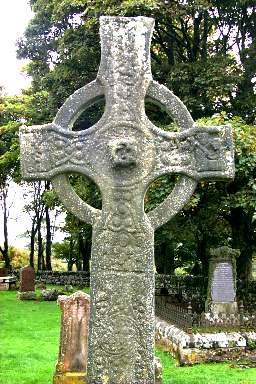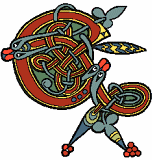Part of what I teach here at the Overseas Ministry Study Center is a a session on Celtic Spirituality. It is also time to sign up for the 22nd Annual Celtic retreat if you want to take advantage of the early bird special.
The Celtic stream of Christianity has impacted many of us who look for a whole life faith that interweaves through every area of life. Their emphasis on the God who is revealed in and through creation has also influenced me and contributed in many ways to my thoughts on the sacredness of creation and its importance as a sanctuary in which we meet God.
The major heritage of Celtic spirituality is the beautiful prayers like this one which are found throughout Ireland, Scotland and Wales. May have been collected in the CARMINA GADELICA. One I love and return to often is this one:
I Weave a Silence
I weave a silence onto my lips,
I weave a silence into my mind,
I weave a silence within my heart.
I close my ears to distractions,
I close my eyes to attractions
I close my heart to temptations.
Calm me, Lord,
As you calmed the storm,
Still me, Lord, keep me from harm,
Let all tumult within me cease,
Enfold me in your peace.
There is however more to this tradition than the prayers that attract me and so thought I would repost this list of Celtic distinctives which some of my may find of interest.
Distinctives of Celtic Christian Spirituality
- Central to Celtic spirituality is incarnation and an intense sense of the presence of God. The Celt was very much a God-intoxicated person whose life was embraced on all sides by the divine Being.
- The presence of Christ was almost physically woven around their lives
- God was treated with awe, reverence and wonder but was essentially seen as a human figure intimately involved in all creation and engaged in a dynamic relationship with it.
- Christ is our “walking companion”. He is our guide, our protector, and we pray with him and can trust him always wherever we go.
- The Trinity is part of God’s eternal family to which we also belong. Each family unit, clan or community was seen as an icon of the Trinity.
- All creation responds to God’s creative presence and sustaining love. God not only encircles and protects creation but also enlivens, activates and inspires it.
- A belief in the thinness of the veil between this world and the next. Heaven and earth are interconnected and interacting.
- Celtic Christians believed that the “cloud of witnesses” is always with us. They prayed consciously as members of the great company of hosts – the persons of the Trinity, angels and archangels as well as all who have gone before us were all seen as close companions on their journey.
- Through this same host of witnesses God protected them from evil forces and enemies.
- Importance of little things – no task is too trivial to be sanctified by prayer and blessing
- All work is holy – Even mundane little task like washing dishes, milking the cow and sowing crops have sacred significance
- This is parallelled in their identification with the little people, the marginalized & the oppressed. All persons represented God and might be heavenly visitors in disguise.
- Extending hospitality opened a door to the kingdom of God and welcomed Jesus into their midst. It was an important expression of love both toward God and neighbour
- According to Celtic theology, the body is essentially good. Sinful action was seen as wrong, but the body is a gift in all its capacities.
- A strong sense of sin and the presence of evil forces in the world resulted in a strong recognition of the need for penitence which often led to austerely ascetic lives. Celtic spirituality holds that sin deforms the person we are called to be in Christ. It enslaves, and the goal therefore is freedom from slavery. Some Celtic saints became perpetual pilgrims or lived as hermits to avoid the comforts and temptations of a settled existence in which evil might flourish.
- All of life flows to a rhythm of ebb and flow reflected in the natural world. This is reflected in the monastic rhythm that flowed between prayer and study, work and rest, community and solitude.
- Celtic Christians adapted well to the culture in which they operated. They are sometimes accused of syncretism because of their use of pre-Christian symbols which they transformed into the symbols of faith.



4 comments
Christine do you have some books you would recommend to read about this.
I am interested in the same thing. I am very drawn to this expression of faith and relate to this on a daily, personal level. But, I have no background or information on this and would love a broader read, Thanks for your help.
Another element of Celtic spirituality I find so healing is that the feminine and females are good. Quite a contrast with the Roman version of Christianity that overcame Celtic spirituality so long ago, but has not managed to kill it.
I have enjoyed that too. St Brigid is one of my favourite Christian saints.